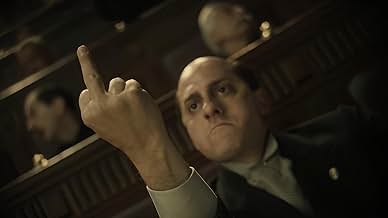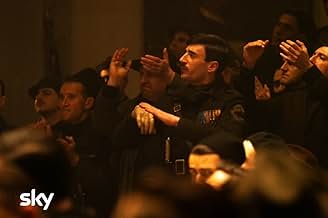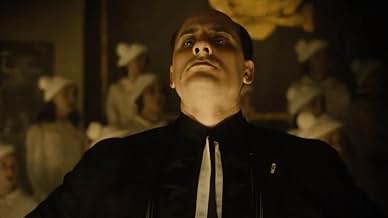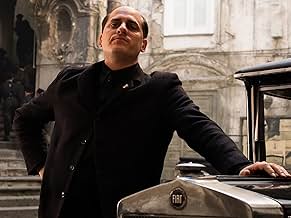M: Il figlio del secolo
- Mini-série télévisée
- 2024–2025
- 52m
Ajouter une intrigue dans votre langueBenito Mussolini's early career from his founding of the Fasci Italiani in 1919 up to the assassination of socialist politician Giacomo Matteotti in 1924 and his speech in Parliament on 3 Ja... Tout lireBenito Mussolini's early career from his founding of the Fasci Italiani in 1919 up to the assassination of socialist politician Giacomo Matteotti in 1924 and his speech in Parliament on 3 January 1925.Benito Mussolini's early career from his founding of the Fasci Italiani in 1919 up to the assassination of socialist politician Giacomo Matteotti in 1924 and his speech in Parliament on 3 January 1925.
- Prix
- 2 victoires au total
Parcourir les épisodes
Avis en vedette
A solid recommendation from me. I really enjoyed the flow, acting, action, and storytelling. I always find it fascinating how such a destructive force can rise to power-what forces support it, oppose it, and which ones get swayed, and why. The quality of the series is excellent. For me, it belongs in the same league as Der Untergang and Unsere Mütter, unsere Väter.
What makes this series particularly compelling is its exploration of the political landscape in Italy at the time. The power struggles between the socialists, the monarchy, and other factions add layers of intrigue, showing how different forces either resisted or enabled the rise of authoritarianism. The shifting allegiances and moral dilemmas make for gripping storytelling.
On top of that, the action sequences are intense and well-executed. The battles, street clashes, and political confrontations feel raw and realistic, adding weight to the historical events. The choreography, cinematography, and pacing of these scenes keep the tension high, making it a visually and emotionally engaging experience.
What makes this series particularly compelling is its exploration of the political landscape in Italy at the time. The power struggles between the socialists, the monarchy, and other factions add layers of intrigue, showing how different forces either resisted or enabled the rise of authoritarianism. The shifting allegiances and moral dilemmas make for gripping storytelling.
On top of that, the action sequences are intense and well-executed. The battles, street clashes, and political confrontations feel raw and realistic, adding weight to the historical events. The choreography, cinematography, and pacing of these scenes keep the tension high, making it a visually and emotionally engaging experience.
While the cinematography is out for everyone to appreciate, I feel a need to stress a couple of key points international audiences might miss.
First and foremost: the series is based on the first of four books about the life of Mussolini, and while they are routinely described as "novels", they are in fact impressively researched from a historical point. Pretty much every dialogue, speech, document and event are openly sourced and beyond question.
While the staging frequently and blatantly is not realistic in order to make the show more spectacular, pretty much everything happened as you see it - including a D'Annunzio's Japanese samurai secretary and other apparently absurd elements.
My second point is about the acting and language. While it will fly above the heads of anyone not _very_ experienced with Italian, the work behind regional accents, lapses into dialects and the very speech patterns of 100 years ago is exceptional indeed. It is a shame this will mostly go unnoticed, as it actually conveys a fair bit of refinement to an already stellar ensemble performance.
Lastly, the (not present in the books) stabs at current politics are far more varied than expected. Like, everyone can understand a sudden fourth-wall-breaking "Make Italy Great Again!", but you'll probably miss the reference to the catastrophic Berlusconi era (delivered via subtle voice and body acting, or even just a brief costume change), or to the sorry state of the last few recent Italian legislatures.
In short: come for the show, stay for the history lesson... and see it with an Italian resident if you can to enjoy it at its fullest.
First and foremost: the series is based on the first of four books about the life of Mussolini, and while they are routinely described as "novels", they are in fact impressively researched from a historical point. Pretty much every dialogue, speech, document and event are openly sourced and beyond question.
While the staging frequently and blatantly is not realistic in order to make the show more spectacular, pretty much everything happened as you see it - including a D'Annunzio's Japanese samurai secretary and other apparently absurd elements.
My second point is about the acting and language. While it will fly above the heads of anyone not _very_ experienced with Italian, the work behind regional accents, lapses into dialects and the very speech patterns of 100 years ago is exceptional indeed. It is a shame this will mostly go unnoticed, as it actually conveys a fair bit of refinement to an already stellar ensemble performance.
Lastly, the (not present in the books) stabs at current politics are far more varied than expected. Like, everyone can understand a sudden fourth-wall-breaking "Make Italy Great Again!", but you'll probably miss the reference to the catastrophic Berlusconi era (delivered via subtle voice and body acting, or even just a brief costume change), or to the sorry state of the last few recent Italian legislatures.
In short: come for the show, stay for the history lesson... and see it with an Italian resident if you can to enjoy it at its fullest.
The film presents the beginnings of Benito Musollini's political career. But to a greater extent it is a study of the creation of a dictatorship. And this is a universal and timeless phenomenon.
What is unusual is the form, which may put off some viewers. The main character often speaks directly to the audience, presents his thoughts and comments on the events taking place, sometimes these allusions are current, e.g. In episode four when he says the slogan MIGA (you will understand when you see it). It is a really great scene.
The film is also quite baroque, at times surreal.
The acting makes a great impression. Luca Marinelli (Musollini) behaves on screen like his prototype. If you know the history and have seen Mussolini's grotesque speeches, you can imagine that this required great skills. Other roles, although episodic, are also worth attention. For example, Benedetta Cimatti is great as the suppressed wife of the Duce.
Due to the specific form of the film, some viewers may be put off by it.
But it's a very good movie.
What is unusual is the form, which may put off some viewers. The main character often speaks directly to the audience, presents his thoughts and comments on the events taking place, sometimes these allusions are current, e.g. In episode four when he says the slogan MIGA (you will understand when you see it). It is a really great scene.
The film is also quite baroque, at times surreal.
The acting makes a great impression. Luca Marinelli (Musollini) behaves on screen like his prototype. If you know the history and have seen Mussolini's grotesque speeches, you can imagine that this required great skills. Other roles, although episodic, are also worth attention. For example, Benedetta Cimatti is great as the suppressed wife of the Duce.
Due to the specific form of the film, some viewers may be put off by it.
But it's a very good movie.
By now it is evident that in the Post-network era and when from the zenith the third Golden Age of Television began its inevitable downward parabola no one, including myself, would have expected such a product... especially an Italian one.
M the son of the century is the classic turn of the century, the breaktrough event or, if you like a film allegory better: it is the hero we need but do not deserve. The future of Our television, it is clear, blatant and unashamed that it will be defined by the 'Before M' and the 'After M'.
Beautiful, beautiful series. Monumental every performance. Ficcanti every dialogue. Generative storytelling from history and brought up to date, without ever becoming exhibitionist. A series one step away from hybris without ever crossing the thin line and, because of this, incredibly verisimilitude in its (deliberate) staging between the theatrical and magical realism.
A possible event, because there is a thick book behind it, not only of volume but also of historical research... but also (oh my God, finally!!!) an adequate budget. It matters little that some images are realistically dated in the staging. It doesn't matter. You want the real date? There's the book but in this instalment it was perfectly there.
A futurist Zang Tumb Tumb series like we've needed for a long time. Because, just like futurism, the last true and pure current of thought and artistic movement that since the publication of its manifesto in 1909 has not found to date a worthy new cultural vision that can be described as truly original and not a rinsing of dishes from other shores. This is M. The first of something else in the making that, los peri pernos, will be even more surprising and innovative.
Zang Tumb Tumb.
M the son of the century is the classic turn of the century, the breaktrough event or, if you like a film allegory better: it is the hero we need but do not deserve. The future of Our television, it is clear, blatant and unashamed that it will be defined by the 'Before M' and the 'After M'.
Beautiful, beautiful series. Monumental every performance. Ficcanti every dialogue. Generative storytelling from history and brought up to date, without ever becoming exhibitionist. A series one step away from hybris without ever crossing the thin line and, because of this, incredibly verisimilitude in its (deliberate) staging between the theatrical and magical realism.
A possible event, because there is a thick book behind it, not only of volume but also of historical research... but also (oh my God, finally!!!) an adequate budget. It matters little that some images are realistically dated in the staging. It doesn't matter. You want the real date? There's the book but in this instalment it was perfectly there.
A futurist Zang Tumb Tumb series like we've needed for a long time. Because, just like futurism, the last true and pure current of thought and artistic movement that since the publication of its manifesto in 1909 has not found to date a worthy new cultural vision that can be described as truly original and not a rinsing of dishes from other shores. This is M. The first of something else in the making that, los peri pernos, will be even more surprising and innovative.
Zang Tumb Tumb.
Compelling plot, striking photography, excellent acting by Marinelli. Above all, a solid portrayal of a particular historical period.
Much more to be appreciated if you speak Italian, because Marinelli's performance is truly a masterpiece, both from a linguistic and human point of view. M is a winning example of how history should be represented in cinema: hard and raw, without unnecessary words or unnecessary events based on fiction.
I really recommend its viewing. However, do not expect a simple and straightforward viewing; the story is purely described, there is no shortage of harsh scenes and I felt like some stories missed some details.
What is interesting is that the meaning of some of the pictures goes beyond the simple political figure to the man, with his fears and weaknesses. Things that, of the figure of Mussolini, never really came out of that period.
Excellent cinematic work.
Much more to be appreciated if you speak Italian, because Marinelli's performance is truly a masterpiece, both from a linguistic and human point of view. M is a winning example of how history should be represented in cinema: hard and raw, without unnecessary words or unnecessary events based on fiction.
I really recommend its viewing. However, do not expect a simple and straightforward viewing; the story is purely described, there is no shortage of harsh scenes and I felt like some stories missed some details.
What is interesting is that the meaning of some of the pictures goes beyond the simple political figure to the man, with his fears and weaknesses. Things that, of the figure of Mussolini, never really came out of that period.
Excellent cinematic work.
Le saviez-vous
- AnecdotesWhen Joe Wright got on board as director, at first he meant to have the actors say their lines in English. Then he changed his mind and chose to shoot the series in Italian, for a higher immediacy.
Meilleurs choix
Connectez-vous pour évaluer et surveiller les recommandations personnalisées
- How many seasons does Mussolini: Son of the Century have?Propulsé par Alexa
Détails
- Date de sortie
- Pays d’origine
- Site officiel
- Langue
- Aussi connu sous le nom de
- M - Son of the Century
- Lieux de tournage
- sociétés de production
- Consultez plus de crédits d'entreprise sur IMDbPro
- Durée52 minutes
- Couleur
Contribuer à cette page
Suggérer une modification ou ajouter du contenu manquant

Lacune principale
By what name was M: Il figlio del secolo (2024) officially released in India in English?
Répondre
![Regarder Trailer Season 1 [OV]](https://m.media-amazon.com/images/M/MV5BYWM4MjYyMDktOWQwNy00NzNlLTg0OGUtZjk5Yzk0MjA2YmNlXkEyXkFqcGdeQXRyYW5zY29kZS13b3JrZmxvdw@@._V1_QL75_UX500_CR0)
























